Disclosure: Meeple Mountain received a free copy of this product in exchange for an honest, unbiased review. This review is not intended to be an endorsement.
When the review copy request went out for the WizKids release Detective Rummy, I threw my name in the ring immediately.
I love the card game Rummy 500. Not just love…love-love. I have been playing Rummy 500 since I was a kid (that, and a ton of Rummikub), so a game about being an olden-time gumshoe detective while incorporating elements of one of my favorite card games was a no-brainer.
The box top made a promise: “7 Mysteries From the Files of the Rummy Detective Agency.” Love mysteries. Deduction games? After games like Turing Machine and The Search for Planet X, I’m always down to play a game that features a good series of mystery elements to tickle the brain, especially if those packages can be delivered in under an hour, like Detective Rummy’s box promised.
I don’t know if “A Mystery Rummy Game” could have been more perfect for me, at least on paper. When the game finally arrived, about a year after this request hit (there were some production issues that slowed down the release), I ripped off the shrink and dug into the rules, carving out time in my review game calendar to make sure I hit this one right away.
Something happened during that rules read, though. It didn’t seem like there was much in the way of “mysteries”, at least like I was hoping. Also, there wasn’t much of the Rummy 500 scoring or pace that I was looking for, since Detective Rummy’s scenarios play out over a very brief six turns. The 1930s cop show feel, with Dick Tracy-style elements and Mike Hammer-adjacent storytelling, give the production a nice sheen, but the storytelling elements didn’t seem to be included in the gameplay.
Then I got a few plays in, and my fears were confirmed. Detective Rummy is somehow not a detective game, nor is it a rummy game. Despite missing those elements, is it good?
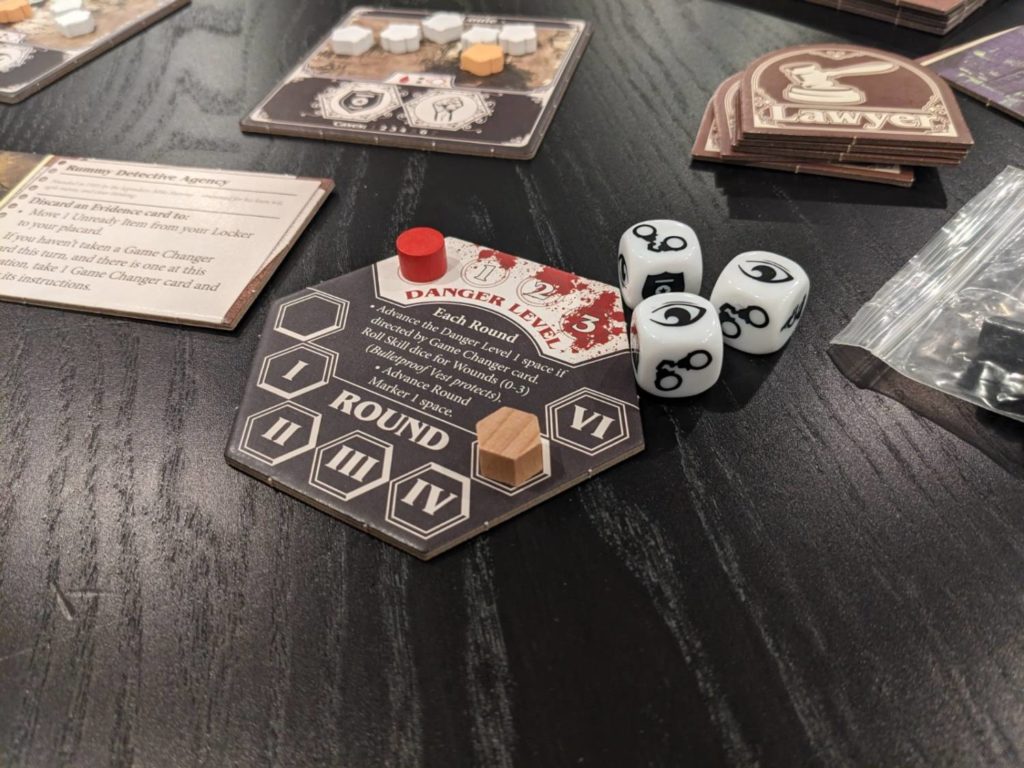
Marlowe, Without the Mystery
Players take on the role of one of six detectives working for the Rummy Detective Agency. The best thing about Detective Rummy: for one of the few times I can remember in gaming history, all of the players can choose to play as a woman or a person of color. This is an achievement I’d like to see in more games: real choice when it comes to taking on a character that I can actually imagine being as well as playing.
This embrace of character is more critical because Detective Rummy is intended to be played as a short campaign game with seven scenarios. (You can play it as a one-off game if you are tight on time or don’t want to commit to seven plays.) Players select a character that must be used for all seven Cases (scenarios); each Case consists of a single “Hand of Play”, and a Hand is composed of six rounds.
Each of the Cases has a name and a slightly varied setup, like which suspects are in play for that round, or different locations which can be visited to take actions. But the core gameplay loop is always the same. Before a round begins, dice may be rolled to take away some of a player’s Skills, or powers. After that, players can choose to do Detective Work (take actions) or Recuperate, which heals the wounds on all Skills and gives players four cards to add to their hand.
In most of a Hand’s six rounds, players will do Detective Work. During this phase, players can visit locations to grab Game Changer cards (which grant abilities, items, and potentially points), turn in sets of three or more matching cards to Investigate Circumstantial Evidence and place a Detective token, or discard a Fingerprint Evidence card to place Detective tokens and possibly draw more cards.
Depending on the Case, you might also have the chance to use items like a bulletproof vest or a gun to take special actions. After playing cards, players can draw new cards before the next player takes a turn.
You might have noticed something. At no point during Detective Rummy do players take any actions resembling actual deduction. When investigating suspects, you’ll turn in matching cards to place tokens, which becomes an area majority mechanic that scores points (Fame) for the player who has the most of their tokens on a suspect. Suspects are simply tiles sitting in the middle of the play area. They don’t have backstories, and you aren’t playing cards that might imply you are tracking their movements or questioning their choice of company.
You are just playing cards that match, say, a Forensics symbol, and if that suspect has a Forensics symbol on their tile, you put a token down. Lather, rinse, repeat, for six turns. At the end of a Case, the suspect with the most Detective tokens from all players is simply guilty of that Case’s crime—robbing a fashion district, poisoning donuts, or (in a turn of events so silly I’m not sure how to justify this) going back in time to solve the murders featuring Jack the Ripper!
Sometimes, these suspects are just characters provided by the game’s events. In others, the suspects are actually the detectives. Scores are totaled by milestone events known as Assignments, as well as the player who has played the most Detective tokens on each suspect. Game Changer cards also provide points, and at the end of each Case, scores are tallied. The winner of the campaign will have the most points after seven Cases. In a one-off game (played over 2-3 Hands), whoever has the most Fame wins.
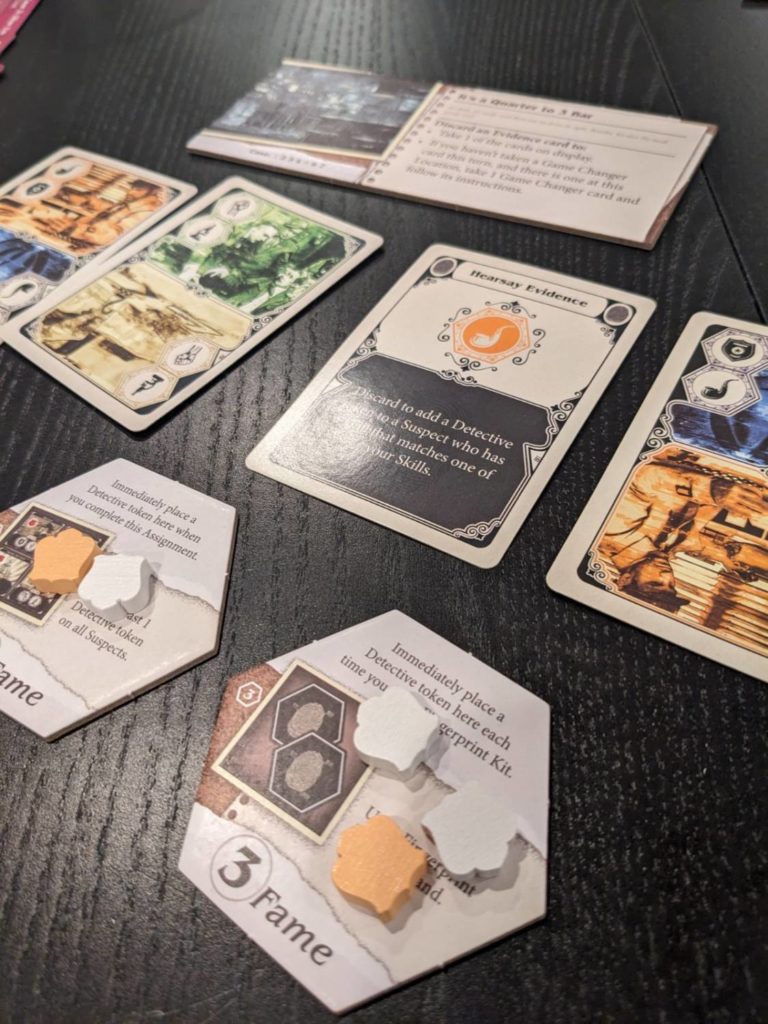
Do You Want Cards, or Not?
One of the issues I found with Detective Rummy started with its indecision regarding your hand of cards. The rulebook pushes the idea that it’s best to end a turn with no cards at all, so that you can draw four cards—two bonus cards for having an empty hand, plus the standard two cards you get at the end of every turn.
Here’s the issue with that: doing anything in Detective Rummy requires cards. You’ll need at least three matching cards to Investigate Circumstantial Evidence. You’ll need a card to discard every time you want to visit a location. You’ll need a card to heal each earlier wound. It’s also helpful to have cards if you want to Investigate Fingerprint Evidence.
Plus, there are interesting rules when it comes to discarding cards purely to empty your hand. You can only do this if you already have certain Skills readied on your player board—it’s a weird mechanic. Ideally, you could dump worthless cards, but you can’t necessarily do that in Detective Rummy.
Another issue: the early Cases are just too easy. In my first two Cases, no one rolled the skill dice once. Dropping Detective tokens on suspects was easy. Completing Assignments was really, really easy. Detective Rummy is a tutorial for its own gameplay for too long, like playing a video game on easy mode but for the entire experience. Characters can’t be killed, and early in each game players will only have 1-2 Skills readied. The chances that a die roll ruins dreams are quite low here, but I don’t think that making this harder would make the game more interesting.
The Lawyer mechanic is a nice touch. Some of the suspects will get access to lawyers, which makes it harder to place Detective tokens on those suspects. That’s a legitimately smart mechanic and it fits here. But there aren’t more touches like that in Detective Rummy. The Fingerprint Kit item is borderline overpowered, especially if you can find an Eyewitness Evidence card, which is the only way to play more than one Fingerprint card on a single turn.
When I began my plays of Detective Rummy, I thought six turns felt way too short for a quick card game. Now that I have a few Cases under my belt, I’m saddened to share that six turns feels one or two turns too long, because there’s just not very much interesting to do in this game.
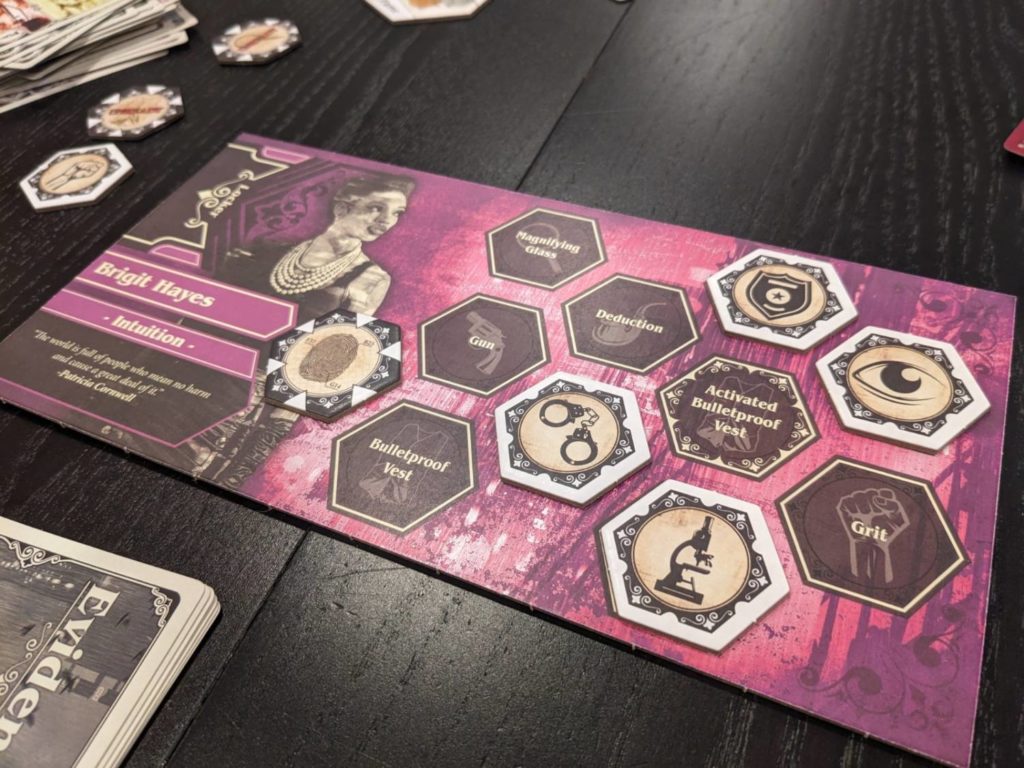
“Oh, I’m Not Sure”
As is the case with all of my reviews, my wife was the person enlisted for my two-player plays of Detective Rummy. Now that I’ve also tried this with more than two players, two players is the perfect player count for the game. I envisioned playing all seven Cases, since the game is so short.
On the first night of our plays, we finished Case One then I began setting up Case Two, not even thinking she might have an issue with another 20-minute play.
“You OK doing one more?” I suggested, without really listening.
[legitimate pause] “…sure.”I looked up while shuffling cards, then paused. “We don’t have to if you aren’t feeling this one—”
“No, let’s do one more. Maybe this next Hand will be better.”
Mind you, that’s where I was too, in terms of my interest in playing. In the process of evaluation, you always want to see a game in its best light. But after the second Case, we debriefed.
“There’s just not much ‘there’ there,” she said. “I’ll play it again next week if you want to keep going through the campaign, but we don’t have to.”
That really got me thinking. Detective Rummy, while a typically handsome WizKids production and a game that I intensely want to like, doesn’t get the juices flowing. Heck, I’ve had more scintillating games of Rummy 500 than games of Detective Rummy.
You play cards, you place tokens. It’s not really a strategy game, since you are a victim of the card draw. Detective Rummy is definitely not a deduction game, since each Case’s guilty suspect is determined only by player actions, not by a pre-selected series of variables or anything resembling logic. If the players throw most of their tokens on the suspect in a game with the Valor symbol because that’s what they had in their hands, bam: that’s the murderer, case closed.
The Assignment (milestone) tiles and the game’s general difficulty really miss here. The hardest Assignment in the game, readying all six of a player’s Skills, nets five Fame. You could knock that out in four rounds with a decent card draw, and doing it by the end of the game is really easy in the first half of the game’s Cases. Other Assignments are much easier; it just seems like Assignments are an activity that anyone can do. In most of my games of Detective Rummy, Assignment scores just canceled each other out because everyone did these so easily.
There’s even the weird moments tied to rolling the Skill dice. When a round begins and these dice have to be rolled, one of the six skills comes up. If you have, say, the Deduction skill and a die roll wounds that skill, all players flip the Deduction skill tile to its bloodied, wounded side. This leads to comical moments when discussing wounded Skills:
“I got shot in the Grit!”
“My Intuition took a bullet!!”
And even when your Intuition takes a bullet, you just have to discard a card to heal that skill back to full health. You’ll be able to heal one skill each turn, so that begs the question: why have players roll these dice at all?
I don’t have an easy fix for making this game better, but it certainly starts with the lack of “wow” moments. Detective Rummy feels like a game that could have used 2-3 more rounds of development, a higher difficulty, even light elements of deduction based on the cardplay, and a punch-up to the pulpy writing style. Had Ryan Laukat (Sleeping Gods, Knight Fall) been involved, that might help. Worldbuilding like the work Mindclash brings to games such as Anachrony would also aid the cause.
But Detective Rummy is in the wild, and I don’t think there’s a way to save it now. Give this one a try as a one-off single play to see where you land before investing in the entire package.


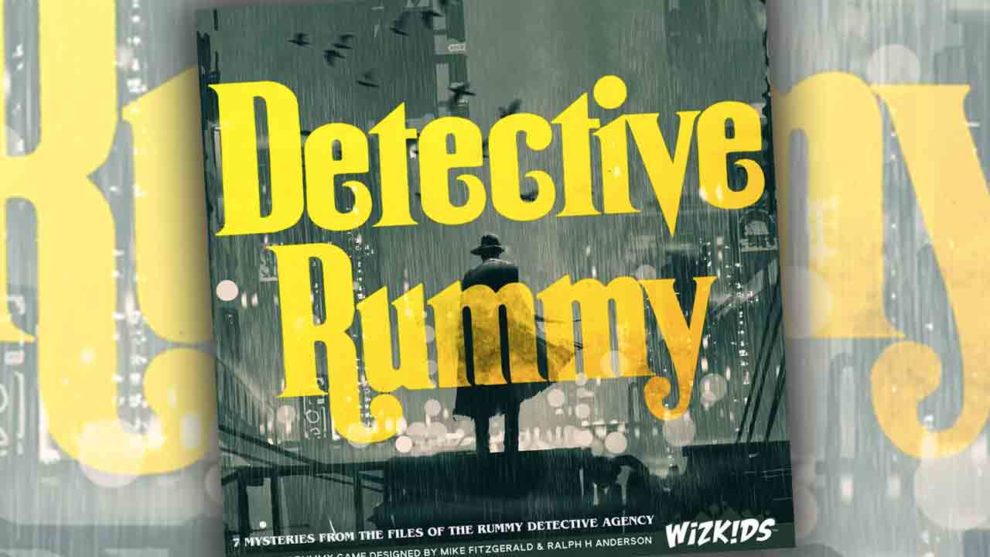

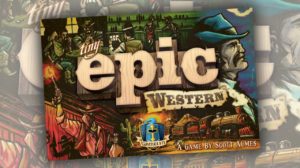


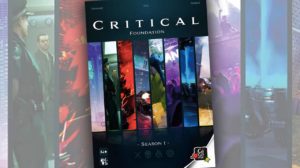




I played rummy 500 with my grandmother, and she was unbeatable. She would mix up all the grandkids’ names, forget recent conversations, but she remembered every, single card I picked up. My happiest moments with her were when we played rummy 500. I haven’t played it since she passed. Thank you for this review. I hadn’t thought about that game in twenty years. It brought back good memories.
What a great memory, thanks for sharing!